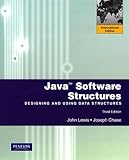Java software structures : designing and using data structures / John Lewis, Joseph Chase.
Material type: TextPublication details: New York : Addison-Wesley, c2010.Edition: 3rd edDescription: 564 p. : ill. ; 24 cmISBN:
TextPublication details: New York : Addison-Wesley, c2010.Edition: 3rd edDescription: 564 p. : ill. ; 24 cmISBN: - 9780131364271
- 0131364278
- 005.133 22
| Item type | Current library | Call number | Copy number | Status | Date due | Barcode | |
|---|---|---|---|---|---|---|---|
 Books
Books
|
Main library General Stacks | 005.133 / LE.J 2010 (Browse shelf(Opens below)) | 1 | Available | 006950 |
Includes bibliographical references and index.
1. Introduction -- 2. Analysis of Algorithms -- 3. Collections -- 4. Linked Structures -- 5. Queues -- 6. Lists -- 7. Recursion -- 8. Sorting and Searching -- 9. Trees -- 10. Binary Search Trees -- 11. Priority Queues & Heaps -- 12. Multi-way Search Trees -- 13. Graphs -- 14. Hashing -- 15. Sets & Maps.
The third edition of Java Software Structures embraces the enhancements of the latest version of Java (Java 6, as well as Java 5), where all structures and collections are based on generics. The framework of the text walks the reader through three main areas: conceptualization, explanation, and implementation, allowing for a consistent and coherent introduction to data structures. Students learn how to develop high-quality software systems using well-designed collections and algorithms.
1
There are no comments on this title.
